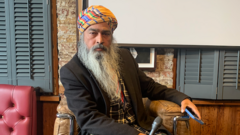In a peculiar press conference hosted at the Frontline Club, anticipation soared as a purported revelation of Bitcoin's creator was announced. The crypto community has long been fascinated by Nakamoto, whose true identity is cloaked in mystery and speculation. His influence is considered essential in the evolution of cryptocurrency, with many intrigued by the staggering wealth Nakamoto would possess, holding over one million bitcoins.
On Thursday, organized by Charles Anderson, a chance was presented for reporters to meet the legendary figure and maybe even gain insight into Bitcoin's origins. However, the entry fees raised eyebrows; attendees were asked for £100 for a front-row seat and offered pricey upgrades for additional questions or interviews. Intrigued, a small group of reporters attended, sensing an opportunity for groundbreaking journalism.
When Mollah took to the stage, a mix of curiosity and skepticism permeated the room. He declared himself Satoshi, but when asked for evidence of his claims, he faltered. Mollah promised to demonstrate the unlocking of early bitcoins but ultimately failed to deliver, leaving reporters frustrated and disappointed.
The event compounded the long history of false identities that have surfaced in the search for Nakamoto. Previous candidates included Dorian Nakamoto, Craig Wright, and even Elon Musk, none of whom have substantiated their claims. Musk dismissed the notion he had any part in Bitcoin's creation, further complicating the matter.
Over the years, some believe the mystery surrounding Nakamoto's identity serves a greater purpose, preserving the decentralized nature of Bitcoin. Experts like Natalie Brunell assert that anonymity is fundamental, removing personal agendas from the cryptocurrency's foundational principles. Conversely, scholars like Carol Alexander argue that the obsession with Nakamoto overshadows crucial discussions about the broader economic implications of cryptocurrencies.
As the event concluded, attendees left with no newfound knowledge and the persistent enigma of Satoshi Nakamoto's identity hanging in the air. The search continues, but for now, it remains just another dead-end in the intricate narrative of Bitcoin.
On Thursday, organized by Charles Anderson, a chance was presented for reporters to meet the legendary figure and maybe even gain insight into Bitcoin's origins. However, the entry fees raised eyebrows; attendees were asked for £100 for a front-row seat and offered pricey upgrades for additional questions or interviews. Intrigued, a small group of reporters attended, sensing an opportunity for groundbreaking journalism.
When Mollah took to the stage, a mix of curiosity and skepticism permeated the room. He declared himself Satoshi, but when asked for evidence of his claims, he faltered. Mollah promised to demonstrate the unlocking of early bitcoins but ultimately failed to deliver, leaving reporters frustrated and disappointed.
The event compounded the long history of false identities that have surfaced in the search for Nakamoto. Previous candidates included Dorian Nakamoto, Craig Wright, and even Elon Musk, none of whom have substantiated their claims. Musk dismissed the notion he had any part in Bitcoin's creation, further complicating the matter.
Over the years, some believe the mystery surrounding Nakamoto's identity serves a greater purpose, preserving the decentralized nature of Bitcoin. Experts like Natalie Brunell assert that anonymity is fundamental, removing personal agendas from the cryptocurrency's foundational principles. Conversely, scholars like Carol Alexander argue that the obsession with Nakamoto overshadows crucial discussions about the broader economic implications of cryptocurrencies.
As the event concluded, attendees left with no newfound knowledge and the persistent enigma of Satoshi Nakamoto's identity hanging in the air. The search continues, but for now, it remains just another dead-end in the intricate narrative of Bitcoin.


















